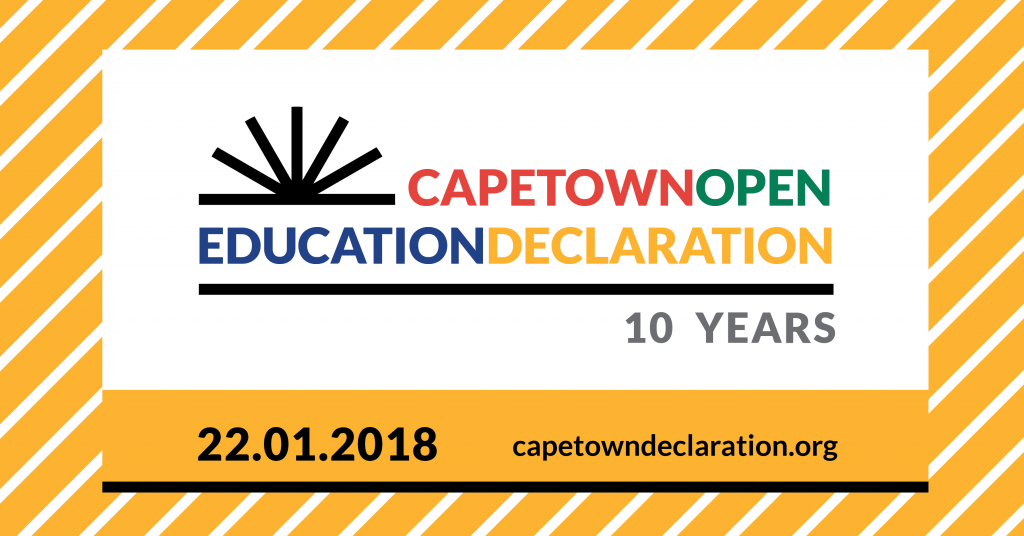Cape Town Open Education Declaration 10th anniversary
We are on the cusp of a global revolution in teaching and learning. Educators worldwide are developing a vast pool of educational resources on the Internet, open and free for all to use. These educators are creating a world where each and every person on earth can access and contribute to the sum of all human knowledge. They are also planting the seeds of a new pedagogy where educators and learners create, shape and evolve knowledge together, deepening their skills and understanding as they go.
This emerging open education movement combines the established tradition of sharing good ideas with fellow educators and the collaborative, interactive culture of the Internet. It is built on the belief that everyone should have the freedom to use, customize, improve and redistribute educational resources without constraint. Educators, learners and others who share this belief are gathering together as part of a worldwide effort to make education both more accessible and more effective.
And it goes on suggesting three strategies to increase the reach and impact of open educational resources:
1. Educators and learners: First, we encourage educators and learners to actively participate in the emerging open education movement. Participating includes: creating, using, adapting and improving open educational resources; embracing educational practices built around collaboration, discovery and the creation of knowledge; and inviting peers and colleagues to get involved. Creating and using open resources should be considered integral to education and should be supported and rewarded accordingly.
2. Open educational resources: Second, we call on educators, authors, publishers and institutions to release their resources openly. These open educational resources should be freely shared through open licences which facilitate use, revision, translation, improvement and sharing by anyone. Resources should be published in formats that facilitate both use and editing, and that accommodate a diversity of technical platforms. Whenever possible, they should also be available in formats that are accessible to people with disabilities and people who do not yet have access to the Internet.
3. Open education policy: Third, governments, school boards, colleges and universities should make open education a high priority. Ideally, taxpayer-funded educational resources should be open educational resources. Accreditation and adoption processes should give preference to open educational resources. Educational resource repositories should actively include and highlight open educational resources within their collections.
So, where are we now, after exactly 10 years from this? The 10 year anniversary was initially marked last year during the World OER Congress , in which a group of open educators, reflecting on progress made by the community over the last ten years and future challenges, collaboratively produced a new set of recommendations to inspire and focus the movement for the next ten years: the Ten Directions to Move Open Education Forward.
These directions complement and expand the three Open Education Declaration strategies by giving particular attention to elements such as communication, empowerment, educational development, open pedagogy, and copyright reform, among others. The Open Education Working Group has been involved in the last element through Communia, a network of activists, researchers and open practitioners who advocate for improvements to the EU copyright framework. We believe that the copyright law is of fundamental importance to move Open Education forward. Indeed, “the availability of openly licensed educational resources continues to grow, a wide variety of cultural and informational resources that are critical for education remain locked up by restrictive copyright terms. Limitations and exceptions to copyright can give teachers and learners the necessary freedoms to use these resources for educational purposes, without having to ask for permission. Copyright reforms taking place around the world can strengthen these exceptions—or hurt education by weakening them”. Last week Communia sent a joint letter to all MEPs working on copyright reform, explaining the changes needed to facilitate the use of copyrighted works in support of education. As we are well aware of, education practices are embedded, and influenced by, social, historical and political dynamics. It is important that we educators become critically aware of these dynamics and become active in making sure that they do not disrupt our pedagogies.
Critical awareness of social, historical and political dynamics affecting educators’ practices is an important topic especially nowadays as globally, we are witnessing major migratory flows, which means that providing social and educational services have become pressing concerns in all regions of the world as we need to make sure everyone is able to access adequate education. The Ten Directions to Move Open Education Forward contain 3 particularly important strategies related to this issue: open pedagogy, educational development and empowerment. OERs have the affordances to be used as an instrument for education to social cohesion within a critical pedagogy discourse (Manca et al., 2017), with particular attention to the aforementioned strategies. Critical pedagogies refer to all those educational experiences promoting transformation, empowerment, and exposing the power dynamics affecting educational development and which can perpetuate social injustice. It is then of vital importance that open educators refer to these strategies (and the others) for both personal development and to design education in a way that helps learners develop the critical skills needed to uncover, observe and recognise how socio-cultural, power and emotion-related dynamics influence society.
With these new, 10 directions, Open education is not only moving forward, but it is becoming the vessel of a democratic pedagogy aimed at educating future generations to what sociologist Edgar Morin defined as “complex lessons in education for the future” (2002). These lessons include the ability to appreciate the common human condition, the way knowledge is (co)constructed and what are the possible errors in this process, the importance of understanding each others and, most importantly, the aptitude to confront and accept the uncertainties and complexities of the socio-cultural reality we inhabit (Manca et al., 2017). The Open Education Working Group is delighted to join the wider community of open educators on this vessel and moving towards these exciting, transformative challenges.
 Open Education Working Group
Open Education Working Group 




Leave a Reply